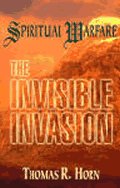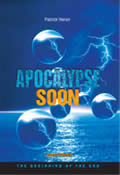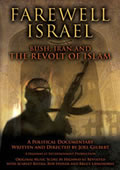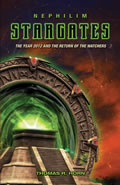READ
IT BEFORE IT'S BANNED BY THE US GOVERNMENT
PART 3
By Thomas R. Horn
May 5, 2009
NewsWithViews.com
Approval Of The Augurs
In my last entry I concluded by stating the obvious, that the end of the Bush administration was accompanied by public desperation for "hope" amidst widespread messianic fervor surrounding the election of America’s current president, Barack Hussein Obama. Bush’s Angel in the Whirlwind administration was thus prophetic in that it resulted in "universal entreaty for an inspirational and political demigod—a savior—to arise on the global scene promising a New World Order."
It
is entirely possible that Bush’s understanding of his calling
as the catalyst of these end-times events was a revelation that grew
on him over time. In the beginning, much of his ties to evangelical
Christianity appear to have simply been for the purpose of producing
political advantages. While still in his 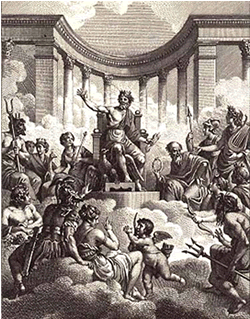 second
term as governor, Bush actually hired influence peddler Karl Rove to
help strategize how he might endear himself to the fundamentalist base
in anticipation of a presidential run. Not long after, the highest-ranking
members of the nation’s politically enthused church leaders were
summoned to the governor’s mansion where the handpicked movers
and shakers, selected for their proven power to sway religious voters,
were encouraged to conduct a “laying on of hands” to anoint
the future president. As the executive mantle was vicariously conferred
on Bush, he surprised the group by suddenly evoking the prophetic commissions
of the prophets, telling the attendees that he had been “called”
(by God) to become the presidential candidate.
second
term as governor, Bush actually hired influence peddler Karl Rove to
help strategize how he might endear himself to the fundamentalist base
in anticipation of a presidential run. Not long after, the highest-ranking
members of the nation’s politically enthused church leaders were
summoned to the governor’s mansion where the handpicked movers
and shakers, selected for their proven power to sway religious voters,
were encouraged to conduct a “laying on of hands” to anoint
the future president. As the executive mantle was vicariously conferred
on Bush, he surprised the group by suddenly evoking the prophetic commissions
of the prophets, telling the attendees that he had been “called”
(by God) to become the presidential candidate.
Most people including even perhaps Bush himself were blissfully unaware of the ancient signature these events represented, especially as it involved the language of Bush’s two inaugural speeches following the precedent setting “anointing” by “holy men” in the state owned mansion. For a few adepts of history and secret orders, the ritualistic parody was deliciously staged. The term “inaugurate” is from the Latin “inauguratio” and refers to the archaic ceremony by which the Roman Augurs (soothsayers) approved a king or ruler (or other action) through omens as being “sanctioned by the gods.” As with Bush, the ancient “inauguration” of the leader occurred after the priestly blessing and magical words were uttered, which assured the congregations and heads of state that the course of action was endorsed by the gods. The omens that the Augurs used in determining the will of the gods included among other things thunder and lightning, as reflected in Bush’s “Angel in the Whirlwind” statements. In modern times, the date on which the U.S. inauguration occurs is also important for occult astrological reasons. January 20th is when the sun moves into the sign of Aquarius, an important fact tied to the presidency of Barack Obama, who likewise rode the Whirlwind into the White House with equally telling symbolism and commentary.
Following Bush’s consecration by the holy men of 1999, only a brief period transpired in which public religious rhetoric surrounding him was no more unusual than the historiography of other American presidents.
Then came the election, followed by 9/11, and the “calling” Bush believed he had received started defining itself in unsettling ways.
Author Bob Woodward noted in his book Bush at War that just three days after 9/11, the president during the National Day of Prayer and Remembrance at the National Cathedral in Washington, DC seemed to assume a divinatory role, as if suddenly he had accepted a fantastic cosmic destiny, declaring that the nation’s responsibility to history was already clear: “to answer these attacks and rid the world of evil.”[10] By taking up the language of “good vs. evil,” Woodward viewed the president “casting his vision and that of the country in the grand vision of God’s master plan.”[1]
Immediately the dialect of Armageddon theology began surfacing in presidential briefings. Even religious publications were startled by it. Some reacted right away, calling on the president to plainly set out his views. Kevin Phillips recorded how in March 2003, “the editors of Christian Century insisted that ‘the American people have a right to know how the president’s faith is informing his public policies, not least his design on Iraq.’”[2] Phillips further stated, “More than Bush’s earlier religious phraseology, his Scripture-flavored preparation for war against Iraq—the latter-day Babylon of biblical notoriety—stirred scrutiny. Those who followed Bush’s religiosity had seen a change, in one pundit’s words, ‘from talking about a Wesleyan theology of ‘personal transformation’ to describing a Calvinist ‘divine plan’ laid out by a sovereign God for the country and himself.’”[3] So alarming was the president’s change in demeanor that even leaders of his own denomination registered dissent. Robin Lovin, Southern Methodist University professor of religion and political thought cautioned that “all sorts of warning signals ought to go off when a sense of personal chosen-ness and calling gets transplanted into a sense of calling and mission for a nation.”[4]
Ultimately the prophetic context for war in the very land associated with future Armageddon (and against Saddam Hussein, no less, the man who claimed to be the reincarnated Nebuchadnezzar) held for Bush the language of moral dualism necessary to play out a “divine mission” while earning him admiration from Dominionists, Neocons, Bonesmen and the guardians of The Craft.
Perhaps more than to anyone else, it was precisely for these members of the “family” and their comrades in secrecy that the most startling coded language was drafted at regular cycle. For them, the phrase “fire in the minds of men” from the second inaugural was not only a call for societal upheaval to usher in a New World Order, but as Phillip Collins, co-author of The Ascendancy of the Scientific Dictatorship recognized, a reference to the Promethean faith. “It [associated] the text of neoconservatism with the text of Promethean radicalism of earlier sociopolitical Utopian movements.”[5]
The observation by Collins that neoconservativism and Prometheanism can be married is keen, as both doctrines are occult visions of a kingdom of God (or gods) on earth established through human endeavor and enlightenment. Prometheus was the Greek Titan that stole fire from the gods and gave it to man. When Prometheus is incarnated in the human mind as the mystical longing for illumination (a “fire in the mind”), the latter produces what James Billington called “the revolutionary faith” or “Promethean faith,” a Gnostic doctrine whose origin was solidified in occult Freemasonry and “scientific” Marxism.
|
Subscribe to the NewsWithViews Daily News Alerts! |
Thus in view of recent history, a fire in the minds of men plus twice referring to the Angel in the Whirlwind were perfect choices for George Bush’s inaugurals. This was also key for those who understood it at the time to unlocking what researcher and academic Peter Dale Scott describes as “deep politics”—those below-surface realities that may for political reasons be hidden from the radar of civilians while at the same time signal the appropriate brokers of power concerning the real or “deep” political and/or spiritual agenda at play. By twice referring to the “angel in the whirlwind,” Bush also certified confirmation from God for his actions (“For God speaks once, yea twice” [Job 22:13]; “In the mouth of two… witnesses” [2 Cor. 13:1]). In occult theology the number “2” is also the Zoroastrian math for dualism, and extended the Manichaean prose necessary for Bush to cast himself as the Son of Light at war with Sons of Darkness. For the Illuminatist, this light is derived from Lucifer, the light-bearer, and, as we shall discover, the Angel in the Whirlwind is key to such dark forces. For part two click below.
Click here for part -----> 1, 2,
Footnotes:
1.
Bob Woodward, Bush at War (New York: Simon & Schuster, 2002), p.
67
2.
Kevin Phillips, American Dynasty: Aristocracy, Fortune, and the Politics
of Deceit in the House of Bush (New York: Penguin Books, 2004), p. 239
3.
Ibid
4.
Debora Caldwell, "George W. Bush, Presidential Preacher,"
Beliefnet, February 17, 2003, p. 1
5.
Phillip Collins, Paul Collins, "An Uprising Against ‘Promethean
Hubris’" Part 2, Jan 14, 2007, rochester92.vox.com


